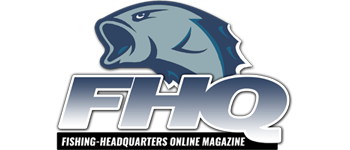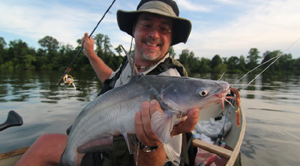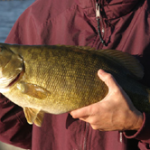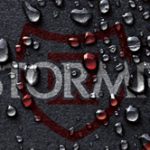By Brad Wiegmann
Common sense and sound judgment was far from any of our minds as we slipped our kayaks and canoes gently into Wheeler Lake on the Tennessee River. It seemed our sensibility was clouded with visions of catching gigantic catfish while fishing from only a long narrow craft powered by only a paddle. No doubt, this trip was going to be the ultimate catfishing adventure.
My ability to behave and think in a reasonable manner often goes out the window when it comes to fishing. Not surprising when Jay Grantland, owner and operator of Alabama Eco Adventures, called and suggested we float down Wheeler Lake in kayaks and canoes while fishing for giant catfish, I jump at the opportunity. Needless to say, our adventure turned out to be quite the catfishing trip.
Traditionally, anglers fish for catfish from shore or in boats and not in kayaks or canoes. In fact, knowledgeable river catfish anglers would think you are insane for attempting to land a large catfish from such a small craft. However, fishing for catfish from a kayak or canoe just adds to the challenge and excitement.
There are several access ramps and launch areas on Wheeler Lake around the Decatur area where anglers can put in their kayaks or canoes. Since our kayaks and canoes were only powered by paddling, we opted to shuttle the pickup vehicle so there was no paddling upstream.
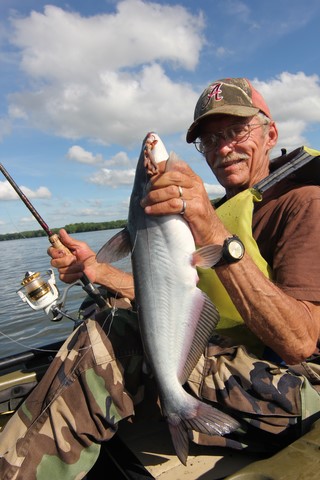 Our group only had two kayaks and two canoes, but Jay explained Alabama Eco Adventures could accommodate large groups if needed. His large fleet of a dozen kayaks and 34 canoes including top of the line WeNoNah Rolalex Heron Canoes that can be rented out. A shuttle service and wilderness guides certified in swift water rescue, CPR and First Aid are also available to go out on the trips.
Our group only had two kayaks and two canoes, but Jay explained Alabama Eco Adventures could accommodate large groups if needed. His large fleet of a dozen kayaks and 34 canoes including top of the line WeNoNah Rolalex Heron Canoes that can be rented out. A shuttle service and wilderness guides certified in swift water rescue, CPR and First Aid are also available to go out on the trips.
Catfishing on Wheeler Lake requires a special rig for presenting baits. On our trip we were blessed with not only having catfish expert Jay Grantland from Alabama Eco Adventures guide us, but also the legendary catfish angler and his father Jerry Grantland. Both having spent years and years fishing for catfish on the Wheeler Lake knew exactly what bait to use, where to fish and how to catch them.
Our rigs were made up of heavy 50 pound monofilament fishing line, two circle hooks, two brass swivels and two 3/4-ounce lead worm weights, one lead 1/2-ounce round barrel sinker and one 1/8-ounce bell sinker with brass eye. The swivels are tied together with 12-inches of 50 pound test monofilament fishing line than 12-inch piece with the weights put on in this order: one worm weight, one barrel weight, one worm weight and the bell sinker with bass eye tied on to the end.
On each swivel a 10-inch piece of 50 pound monofilament fishing line with a circle hook is attached. The stiff monofilament line keeps the rig from twisting and tangling as it is dragged across the bottom of the river. While the weight is just heavy enough to keep it dragging across the bottom without being snagged.
We used a variety of rods and reels. Jay and Jerry recommended using heavy tackle for catfishing in the river. Knowing that we loaded up a DH 4000z and DH 3000z WaveSpin Spinning Reels with 50 pound monofilament fishing line. The larger DH 4000z and DH 3000z WaveSpin Reels were chosen because of the larger spool size and its ability to prevent the fishing line from tangling or ending up with a bird nest.
Another reason why we used the DH 4000z and DH 3000z WaveSpin Reels (www.wavespinreel.com) was the drag system. They both have an exclusive 10 disc drag system that eliminates the catching effect ensuing in a silky smooth drag.
Once out on Wheeler Lake, we employed a technique referred to as dragging to catch the catfish. “Catfish in Wheeler Lake relate to the bottom and like to hide around rocks or anything that breaks the current. So you want your bait to be right off the bottom,” Jay continued, “by letting the weight drag across the bottom very slowly a catfish can easily eat your bait.”
“You want to be moving really slow and your bait even slower. Big catfish don’t like working for a meal. They want it put right in their face,” said Jerry.
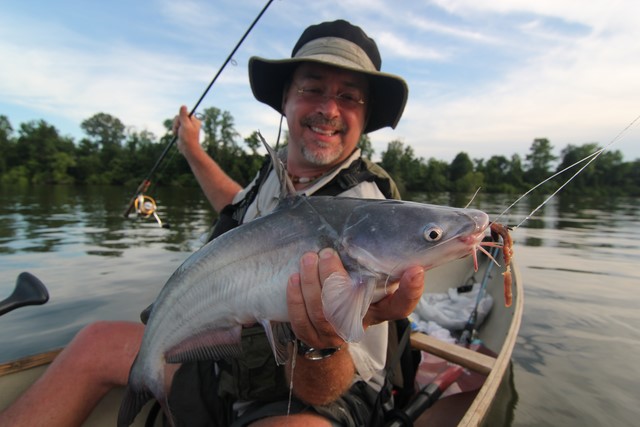
Both agreed that raising up the rod tip every so often would reduce the number of snags. If an angler did get snagged, they would just paddle upstream and pull on the line to get it loose. The key to getting bites and catching catfish was keeping the rig almost vertical while drifting downstream.
Bait selection for catfishing on Wheeler Lake depended on the time of year and current conditions. Jay and Jerry liked all the normal baits like shad, perch, chicken liver and prepared bait. After a hard rain, they like to use nightcrawlers since catfish are feeding heavily on them as they are washed into the river.
During the summer months and in to the fall, Jay and Jerry focus on fishing the flats with hard rocky bottoms. The bigger catfish prefer the hard bottom and having cover like bigger rocks or logs to hide behind, in addition to providing an excellent ambush spot. During the springtime, Jay and Jerry focus on fishing the shallow backwater slews. Over the years, Jay and Jerry have learned where these locations are, but they could also be located with a sonar unit if there was one on your kayak or canoe.
By the end of our trip, we had caught a number of channel catfish and blue catfish. Unfortunately, the really big catfish avoided our hooks. However, what was lacking in size was made up by the number of catfish we caught. It would have easily been enough for a couple of meals and for today that’s okay, but next time watch out big catfish because we are coming to catch you out of a kayak.
![]()
Brad Wiegmann
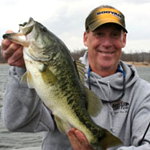
Online Contributor
Brad Wiegmann just wants to fish, but his wife told him to get a job so he works as a freelance outdoor writer and photographer when not fishing. Brad has written for countless magazines and websites, and been featured, which includes Arkansas Sportsman, Southern Outdoors, Outdoor Life, and Bassmaster. Besides being a freelance outdoor writer and photographer, Brad also has his own award winning website www.BradWiegmann.com.

